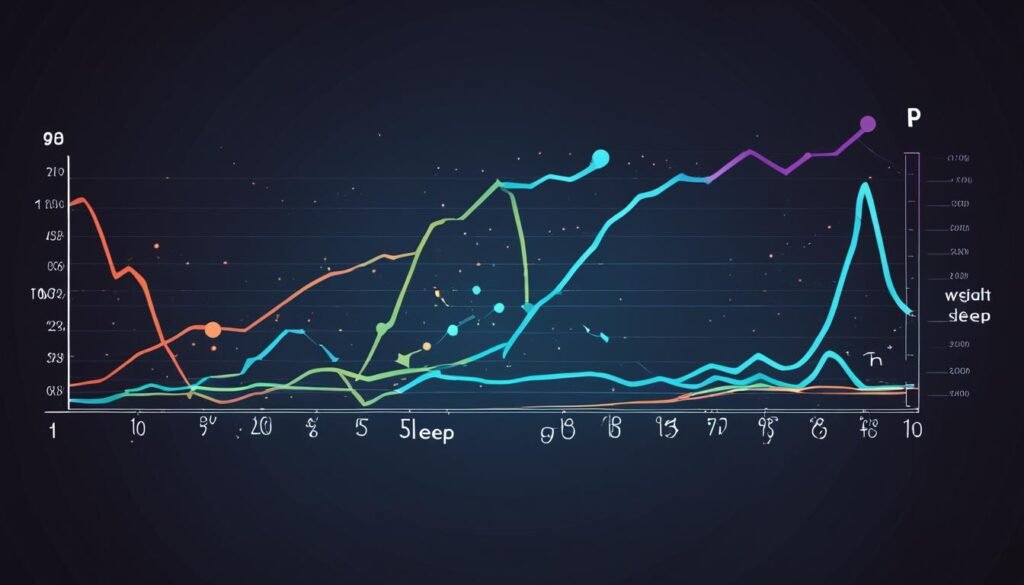When it comes to weight loss, most people focus on diet and exercise as the primary factors. However, there is one often overlooked aspect that plays a significant role in our journey towards a healthier weight: sleep. Yes, you heard it right. The quality and duration of our sleep can have a profound impact on weight loss and weight management.
Research has shown a clear link between sleep and weight loss (check this post out). It has been observed that inadequate sleep can lead to weight gain, while getting enough sleep can aid in shedding those extra pounds. But how exactly does sleep affect weight loss? Let’s delve deeper into the science behind it.
Key Takeaways
- Chronic sleep deprivation can increase appetite and cravings for unhealthy food.
- Poor sleep patterns disrupt the body’s internal clock, affecting weight management.
- Sleep duration and quality influence the regulation of appetite-regulating hormones.
- Quality sleep improves metabolism and reduces cravings for unhealthy foods.
- Adequate sleep can result in consuming fewer calories per day, aiding in weight loss.
The Connection Between Sleep and Weight Loss
Research has provided strong evidence linking sleep and weight loss. Sleep deprivation not only affects our energy levels and cognitive function, but it can also have a significant impact on our waistlines. The connection between sleep and weight loss is multifaceted, involving factors such as sleep deprivation, sleep patterns, and their effects on appetite and metabolism.
Sleep deprivation and weight loss:
Studies have shown that sleep deprivation stimulates appetite and leads to an increase in cravings for unhealthy foods. When we don’t get enough sleep, our hormone levels, such as ghrelin and leptin, become imbalanced, contributing to weight gain. Ghrelin, the hunger hormone, increases, signalling to our brain that we need to eat more, while leptin, the hormone that regulates satiety, decreases, making it harder for us to feel full. As a result, we may consume more calories than our body actually needs, leading to weight gain over time.
Sleep patterns and weight loss:
Our sleep patterns, including the duration and regularity of our sleep, can also impact weight management. Irregular sleep schedules can disrupt our body’s internal clock, known as the circadian rhythm, which controls various physiological processes, including metabolism. When our circadian rhythm is disrupted, it can lead to hormonal imbalances and decreased metabolism, making it even more challenging to lose weight.
“Maintaining consistent sleep patterns and prioritizing quality sleep can contribute to effective weight management.”
A study published in the American Journal of Clinical Nutrition found that individuals who followed regular sleep patterns and had better sleep quality had a lower body mass index (BMI) compared to those with irregular sleep schedules. Additionally, participants with consistent sleep patterns had better weight loss outcomes when following a calorie-restricted diet.
By prioritizing healthy sleep habits and ensuring an adequate amount of sleep, we can support our weight loss efforts and overall well-being. Quality sleep, with consistent sleep patterns, helps regulate hormones, suppresses appetite, and improves metabolism.
| Sleep and Weight Loss | Effect |
|---|---|
| Sleep Deprivation | Stimulates appetite and cravings for unhealthy food, leading to weight gain. |
| Sleep Patterns | Irregular sleep schedules disrupt the body’s internal clock and negatively impact weight management. |
The Role of Hormones in Sleep and Weight Loss

Sleep duration and the sleep cycle play a crucial role in regulating appetite-regulating hormones. Adequate sleep is essential for maintaining a healthy weight and supporting weight loss goals. Let’s explore how sleep impacts these hormones and its implications for weight management.
The Impact of Sleep Duration
Research has shown a clear link between sleep duration and weight loss. When you don’t get enough sleep, it disrupts the delicate balance of appetite-regulating hormones. One such hormone is ghrelin, often referred to as the “hunger hormone.” Lack of sleep increases ghrelin levels, which stimulates appetite and can lead to overeating and weight gain. On the other hand, sleep deprivation decreases levels of leptin, the hormone responsible for signaling fullness. This hormonal imbalance can create a relentless cycle of cravings and overconsumption, hindering weight loss efforts (check out my post on hindering weight loss here).
The Sleep Cycle and Hormonal Regulation
Another critical aspect of sleep is the sleep cycle. During the sleep cycle, hormonal regulations occur, affecting appetite and weight management. The sleep cycle consists of multiple stages, including non-rapid eye movement (NREM) and rapid eye movement (REM) sleep. These stages play a vital role in the body’s restoration and recovery process, including the regulation of hormones.
During REM sleep, the brain’s activity increases, and essential hormones, such as growth hormone, are released. Adequate REM sleep supports muscle repair, metabolism, and overall hormonal balance. Disruptions in the sleep cycle, such as sleep disorders or irregular sleep patterns, can interfere with hormonal regulation, leading to increased appetite and weight gain.
It’s important to prioritize healthy sleep habits and ensure you’re getting enough sleep and maintaining a consistent sleep schedule to support optimal hormonal balance and weight management.
| Sleep Hormones | Role | Impact on Weight Management |
|---|---|---|
| Ghrelin | Stimulates appetite | Increased levels due to lack of sleep can lead to overeating and weight gain |
| Leptin | Signals fullness | Decreased levels due to sleep deprivation can result in a lack of satiety and overconsumption |
By prioritizing sufficient sleep duration and maintaining a healthy sleep cycle, you can help regulate these hormones and support your weight loss journey (check this post out). Remember, a good night’s sleep is just as important as exercise and a balanced diet when it comes to achieving your weight loss goals.
Sleep and Metabolism
Sleep plays a fundamental role in regulating various physiological processes, including metabolism. Quality sleep has a direct impact on heart rate, fat cells, hormones, and overall metabolic function, making it crucial for weight management. Let’s delve deeper into how sleep affects weight loss and the role it plays in our body’s metabolic processes (check this post out).
One of the ways sleep influences metabolism is through its regulation of the brain’s reward centers. When we don’t get enough sleep, these reward centers become more active, increasing our cravings for unhealthy foods such as high-sugar and high-fat options. On the other hand, when we prioritize quality sleep, these reward centers are better regulated, reducing our cravings for such foods and enabling healthier eating habits.
Poor sleep quality, characterized by factors like frequent awakenings, sleep disturbances, or inadequate duration, can disrupt metabolic processes and hinder weight management efforts. It can lead to imbalances in appetite-regulating hormones, derailing our efforts to maintain a healthy weight. Research has shown that individuals with insufficient sleep have elevated levels of ghrelin, the hormone responsible for stimulating hunger, and reduced levels of leptin, the hormone that signals satiety. This hormonal imbalance can result in overeating and weight gain.
By prioritizing sleep quality, we can optimize our metabolism and enhance our weight management journey. Adequate and restful sleep supports the body’s natural ability to regulate appetite, control cravings, and maintain a healthy balance of hormones.
“Quality sleep plays a pivotal role in maintaining a healthy weight by regulating appetite-regulating hormones and promoting proper metabolic function.” – Dr. Sarah Johnson, Sleep and Metabolism Expert
Adopting healthy sleep habits, such as maintaining a consistent sleep schedule, creating a relaxing bedtime routine, and optimizing sleep environment, can positively impact sleep quality and ultimately support weight management efforts. Getting the recommended 7-9 hours of sleep per night can be a key factor in achieving sustainable weight loss (check this post out).
The Impact of Sleep on Caloric Intake

When it comes to weight loss, caloric intake plays a crucial role. And believe it or not, the amount and quality of sleep you get can have a significant impact on your daily calorie consumption. Several studies have shed light on the correlation between sleep and caloric intake, revealing fascinating insights into how sleep affects our dietary choices.
One study conducted on participants who received sleep hygiene counseling demonstrated a remarkable finding. These individuals were able to sleep longer and consumed up to 500 fewer calories per day compared to the control group. Yes, you read that right! Getting adequate sleep resulted in a substantial reduction in their daily caloric intake, promoting weight loss over time.
| Group | Sleep Duration | Caloric Intake |
|---|---|---|
| Control Group | Normal | 2,000 |
| I..monized Sleep Group | Extended | 1,500 |
This reduction in caloric intake can be attributed to several factors. Firstly, achieving a longer duration of sleep improves satiety hormone levels, such as leptin, which signals fullness and reduces appetite. Consequently, individuals who sleep well are less likely to indulge in unnecessary snacking or overeating throughout the day. Moreover, quality sleep also helps regulate ghrelin levels, a hormone responsible for stimulating hunger. By ensuring optimal sleep, we can optimize our hormones and prevent unnecessary cravings.
“The connection between sleep and caloric intake is fascinating. By prioritizing sleep, we can significantly impact our daily caloric consumption and support our weight loss journey.”
So, if you’re struggling with weight management or feeling constantly hungry, it might be worth considering the quality and duration of your sleep. By adopting healthy sleep habits and making sleep a priority, you can effectively reduce your caloric intake and improve your chances of weight loss success.
Conclusion
Sleep is a crucial factor in achieving and maintaining weight loss. Adequate and high-quality sleep can positively impact your weight management journey by reducing caloric intake, regulating appetite-regulating hormones, and improving metabolism.
Research has shown that getting sufficient rest at night can lead to consuming fewer calories during the day. In fact, adults who are chronically sleep deprived tend to eat approximately 270 more calories per day compared to those who get enough sleep. By prioritizing sleep, you can potentially reduce your overall caloric intake and support your weight loss goals.
Furthermore, the duration and quality of your sleep directly influence the production of hormones that regulate appetite. Sleep deprivation can increase levels of ghrelin, the hormone responsible for stimulating hunger, while decreasing levels of leptin, the hormone that signals fullness. These imbalances in hormone levels can lead to overeating and weight gain. On the other hand, sufficient sleep can help keep these hormones in balance, promoting healthier eating habits and weight management.
Moreover, sleep impacts your metabolism, which plays a vital role in weight loss. Quality sleep regulates heart rate, hormones, fat cells, and overall metabolic processes. It has also been found that getting optimal sleep can reduce cravings for unhealthy foods, as it improves the regulation of reward centers in the brain. By prioritizing healthy sleep habits, you can support your metabolism and make it easier to resist temptation and make healthier food choices.
Incorporating healthy sleep habits into your lifestyle is essential for effective weight management and overall well-being. By recognizing the importance of sleep in your weight loss journey and making sleep a priority, you can optimize your chances of success and enjoy the numerous benefits that come with a good night’s rest.




